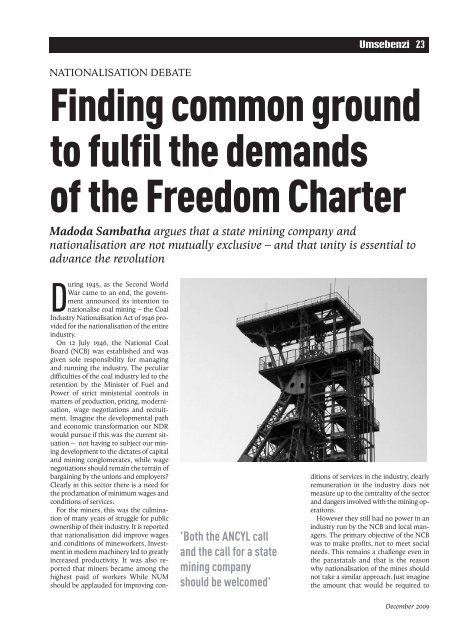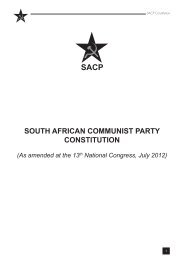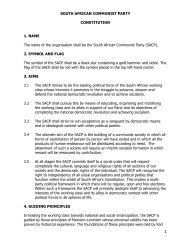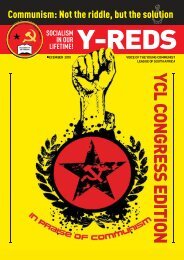Forward to Socialism!! - South African Communist Party
Forward to Socialism!! - South African Communist Party
Forward to Socialism!! - South African Communist Party
Create successful ePaper yourself
Turn your PDF publications into a flip-book with our unique Google optimized e-Paper software.
Umsebenzi 23<br />
NATIONALISATION DEBATE<br />
Finding common ground<br />
<strong>to</strong> fulfil the demands<br />
of the Freedom Charter<br />
Madoda Sambatha argues that a state mining company and<br />
nationalisation are not mutually exclusive – and that unity is essential <strong>to</strong><br />
advance the revolution<br />
During 1945, as the Second World<br />
War came <strong>to</strong> an end, the government<br />
announced its intention <strong>to</strong><br />
nationalise coal mining – the Coal<br />
Industry Nationalisation Act of 1946 provided<br />
for the nationalisation of the entire<br />
industry.<br />
On 12 July 1946, the National Coal<br />
Board (NCB) was established and was<br />
given sole responsibility for managing<br />
and running the industry. The peculiar<br />
difficulties of the coal industry led <strong>to</strong> the<br />
retention by the Minister of Fuel and<br />
Power of strict ministerial controls in<br />
matters of production, pricing, modernisation,<br />
wage negotiations and recruitment.<br />
Imagine the developmental path<br />
and economic transformation our NDR<br />
would pursue if this was the current situation<br />
– not having <strong>to</strong> subject our mining<br />
development <strong>to</strong> the dictates of capital<br />
and mining conglomerates, while wage<br />
negotiations should remain the terrain of<br />
bargaining by the unions and employers?<br />
Clearly in this sec<strong>to</strong>r there is a need for<br />
the proclamation of minimum wages and<br />
conditions of services.<br />
For the miners, this was the culmination<br />
of many years of struggle for public<br />
ownership of their industry. It is reported<br />
that nationalisation did improve wages<br />
and conditions of mineworkers. Investment<br />
in modern machinery led <strong>to</strong> greatly<br />
increased productivity. It was also reported<br />
that miners became among the<br />
highest paid of workers While NUM<br />
should be applauded for improving con-<br />
'Both the ANCYL call<br />
and the call for a state<br />
mining company<br />
should be welcomed'<br />
ditions of services in the industry, clearly<br />
remuneration in the industry does not<br />
measure up <strong>to</strong> the centrality of the sec<strong>to</strong>r<br />
and dangers involved with the mining operations.<br />
However they still had no power in an<br />
industry run by the NCB and local managers.<br />
The primary objective of the NCB<br />
was <strong>to</strong> make profits, not <strong>to</strong> meet social<br />
needs. This remains a challenge even in<br />
the parastatals and that is the reason<br />
why nationalisation of the mines should<br />
not take a similar approach. Just imagine<br />
the amount that would be required <strong>to</strong><br />
December 2009















